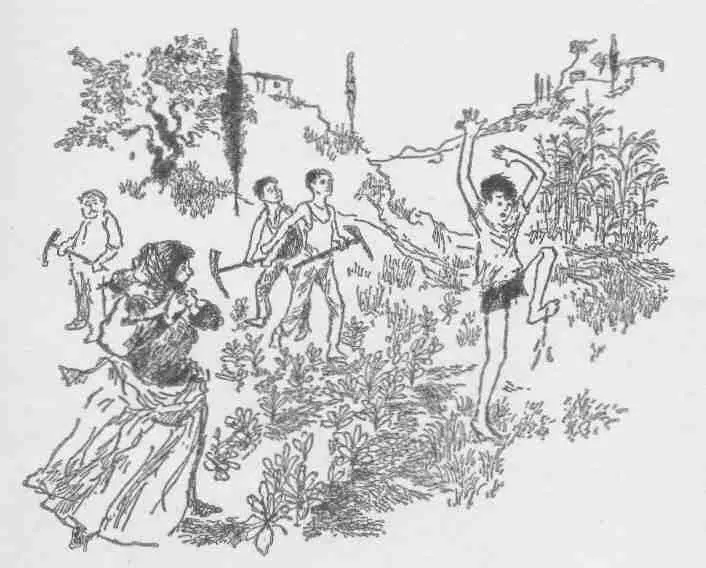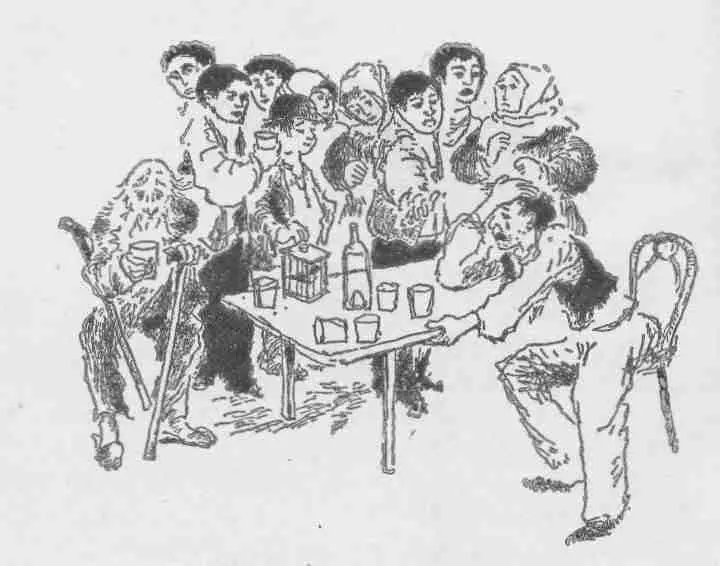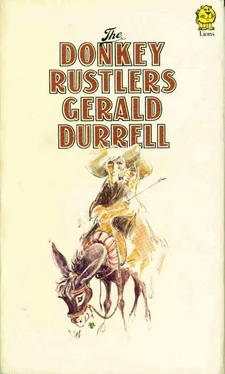“No, no, my golden boy,” bellowed Papa Nikos, “we won’t let you die. We’ll take you to the village and get a hot iron.”
“Garlic and olive oil,” shrilled Mama Nikos. “Not a hot iron.”
“Shut up, woman,” shouted Papa Nikos. “Do you think that I, with all my experience, don’t know best?”
“I am dying,” moaned Yani in a most realistic, quavering voice.
“Give him a drop of wine! commanded Papa Nikos. “There’s a bottle near the donkeys.”
So excited were the whole family over Yani’s predicament that one of the sons ran and fetched the bottle of wine without even noticing that the donkeys were no longer tethered to the fig tree. Yani fainted with great realism and they had to lift his head and force a dribble of wine through his clenched teeth.

“I’m dead,” he moaned, coming round. “I’m dead!”
“No, my soul. No, my soul,” shouted Papa Nikos. “We’ll take you this instant to the village and cure you. Go and get one of the donkeys to carry him on.”
The sons ran to obey him and then suddenly came to a halt when they realised that the fig tree was donkeyless.
“Papa,” they said, “the donkeys have disappeared.” Papa Nikos’s face grew purple with rage. “You foolish woman,” he said, rounding on his wife as being the obvious cause of the trouble. “You couldn’t have tied them up properly. You fish brain.”
“Fish brain!” screeched Mama Nikos indignantly. “Fish brain yourself. I tied them up perfectly well.”
“Well, they’ve disappeared, so you can’t have done,” said Papa Nikos.
“I’m dying,” moaned Yani.
“Well, we’ll have to carry him up to the village,” said Papa Nikos, “and come back to look for the donkeys afterwards. They can’t have gone far.”
“I’m already dead,” said Yani. “It’s useless taking me to the village.”
“No, no, my soul,” said Papa Nikos, patting him gently. “You’ll not die.”
The four of them lifted Yani up and trudged wearily back to the village with him, Yani assuring them every step of the way that they might just as well put him down under an olive tree and leave him to die as there was no hope for him.
At length, panting and exhausted, they reached the main square of the village, where people were just starting to come to life. Two tables in the café were hastily put together and Yani was laid upon them. Immediately, practically the entire village gathered round. Even Papa Yorgo (well over a hundred as you will remember) tottered out to give his advice, which was listened to respectfully as he was the oldest inhabitant and should therefore have had more experience with snake bite than anybody else. Everybody talked at once. Everybody contradicted everybody else and the whole scene took on such mammoth proportions that Yani was hard pressed not to laugh. Eventually, after his foot had been anointed with seventeen different remedies and bound up in a piece of most unhygienic cloth, he was carried reverently down to his house and put to bed. They closed the shutters and door firmly to keep out every breath of fresh air, for it was well known that fresh air was the worst thing you could have in the case of illness and then, stridently arguing, they made their way back to the village and in the gloom of his little room Yani lay on his bed and laughed until the tears poured down his cheeks.
Never had the village of Kalanero known such a day as this. The villagers returned to the village, still chattering excitedly over Yani’s snake bite and they were just beginning to disperse and go their separate ways when into the village square ran Philimona Kouzos with a face the colour of putty.
“All of you! All of you!” he yelled dramatically. “Witchcraft! Witchcraft!”
He collapsed at one of the café tables and began to sob dramatically. “Witchcraft!”

The word riveted the villagers as no other word could. Even Papa Yorgo (well over a hundred as you will recall) had to drink two ouzos in swift succesion. The villagers gathered round the sobbing Kouzos.
“Tell us, Philimona Kouzos,” they begged, “what is this witchcraft that you are speaking of?”
Kouzos lifted a tear-stained face.
“Last night,” he said between sniffs, “late at night, I heard a noise outside my house. Now I am, as you know, a man of extreme courage.”
So fascinated were the villagers by his story that they did not greet this palpable falsehood with the roar of derisive laughter that would have been normal in the circumstances.
“Taking my gun and lantern,” continued Kouzos, wiping his nose on his sleeve, “I walked out into the night.”
The villagers gasped and crossed themselves. “Suddenly,” said Kouzos, “from behind a tree something leapt out.”
“What was it, Philimona?” inquired Papa Yorgo in a quavering voice.
Kouzos lowered his voice to a thrilling whisper.
“It was Vyraclos,” he hissed dramatically.
There was a rustle of indrawn breath from the crowd which now surrounded Kouzos. Kouzos had actually seen Vyraclos!
“What did he look like? What did he look like?” they asked.
“He looked,” said Kouzos, drawing on his imagination, “like a goat with man’s form, only with the face of a snarling dog and with two great horns. Also he had a long tail with a fork at the end.”
“Yes, yes,” agreed Papa Yorgo, nodding his head. “That’s Vyraclos all right. I remember an uncle of mine on my mother’s side saw him once. That was exactly how he described him.”
“He said, ‘Kouzos, I have come for your soul’,” Kouzos went on.
The villagers gasped again.
“Luckily, as I am a good, honest God-fearing man, I invoked our patron saint so I knew that he could do me no harm.”
“Are you sure,” said Petra, who was the village cynic, “that you didn’t take a little too much wine last night, Philimona?”
Philimona drew himself up with dignity.
“I was not drunk,” he said coldly, “and there’s more to come.”
More to come? The villagers could hardly contain themselves. This was, without doubt, one of the most exciting things that had ever happened in Kalanero.
“What more is there?” they clamoured eagerly.
“This morning,” said Kouzos, “when I went out to get my donkeys, I found that the lock — that fine big one belonging to my father — had been wrenched from the door as if by a gigantic hand, and my donkeys had vanished.”
“Vanished?” asked the villagers.
“Vanished,” said Kouzos. “And now I am a ruined man.” He burst into tears once again and started hammering his fists on the table.
“Vyraclos has ruined me,” he wailed. “Because the good saint wouldn’t let him take my soul, he took my donkeys instead.”
“Are you sure.” asked Petra, “that they haven’t just wandered into the olives?”
“Do you think I haven’t searched?” screamed Kouzos. “Everywhere I have been searching. They have disappeared without trace.”
The villagers looked at each other uneasily, for, what with Yani’s snake bite and one thing and another, they all realised that none of them had checked on their donkeys as yet. Immediately the crowd melted away as they all hurried home to see if their donkeys were safe. But within half an hour they were back in the village square and the clamour of horror and indignation had to be heard to be believed as the villagers all tried to tell the story of their missing donkeys at once.
Читать дальше












